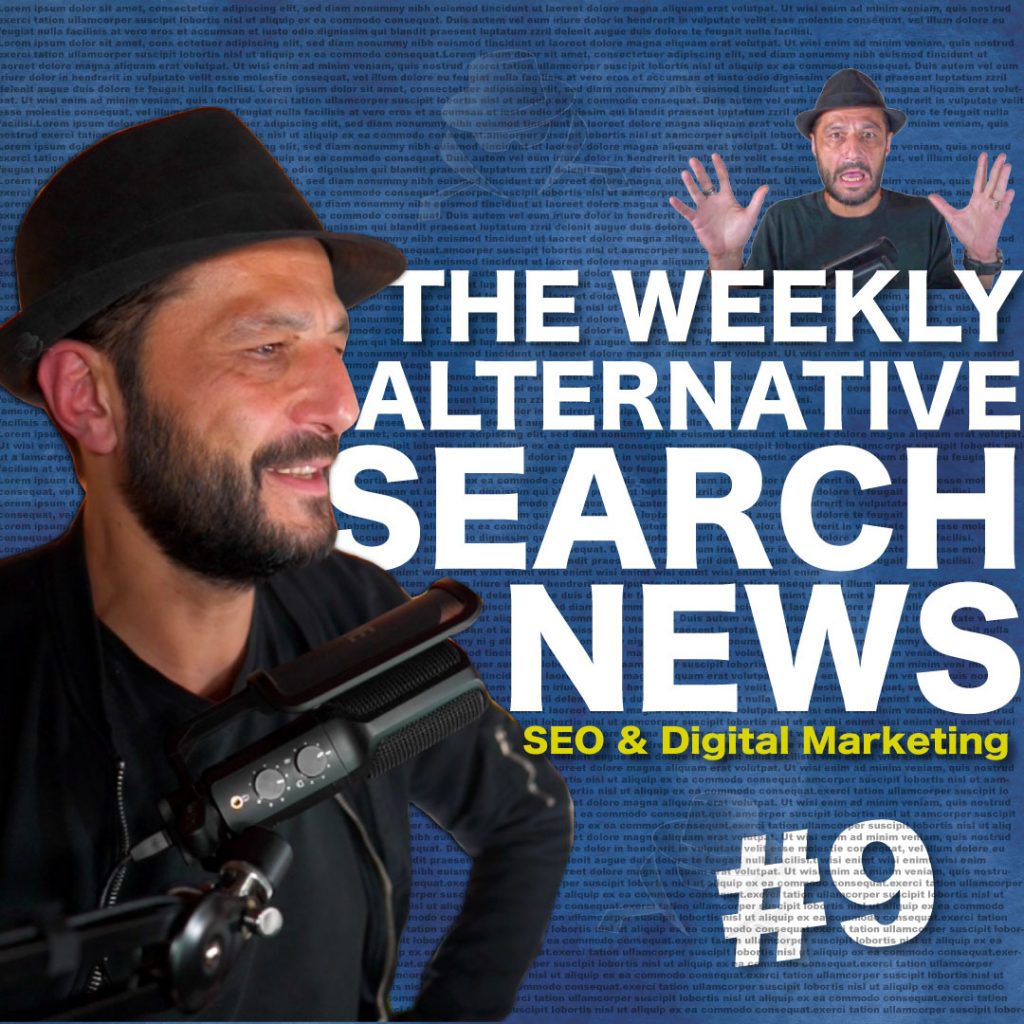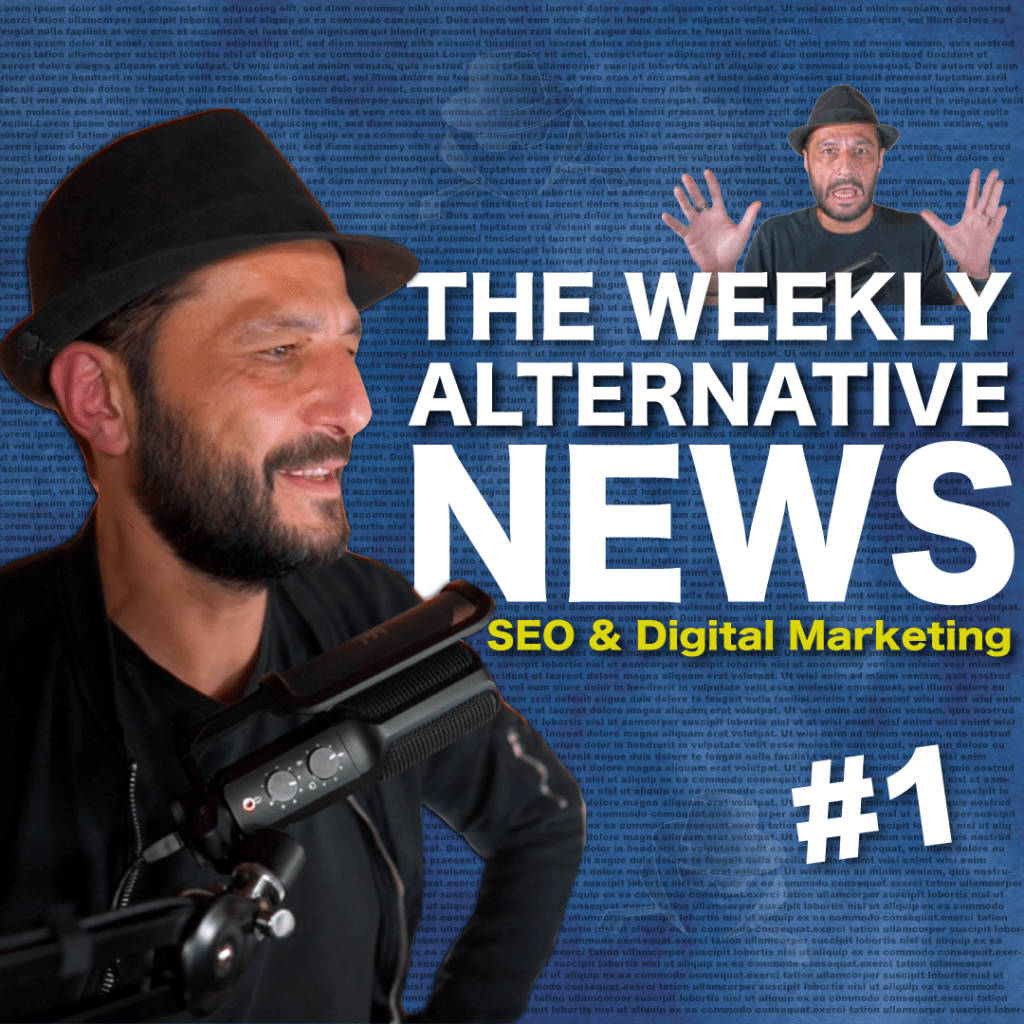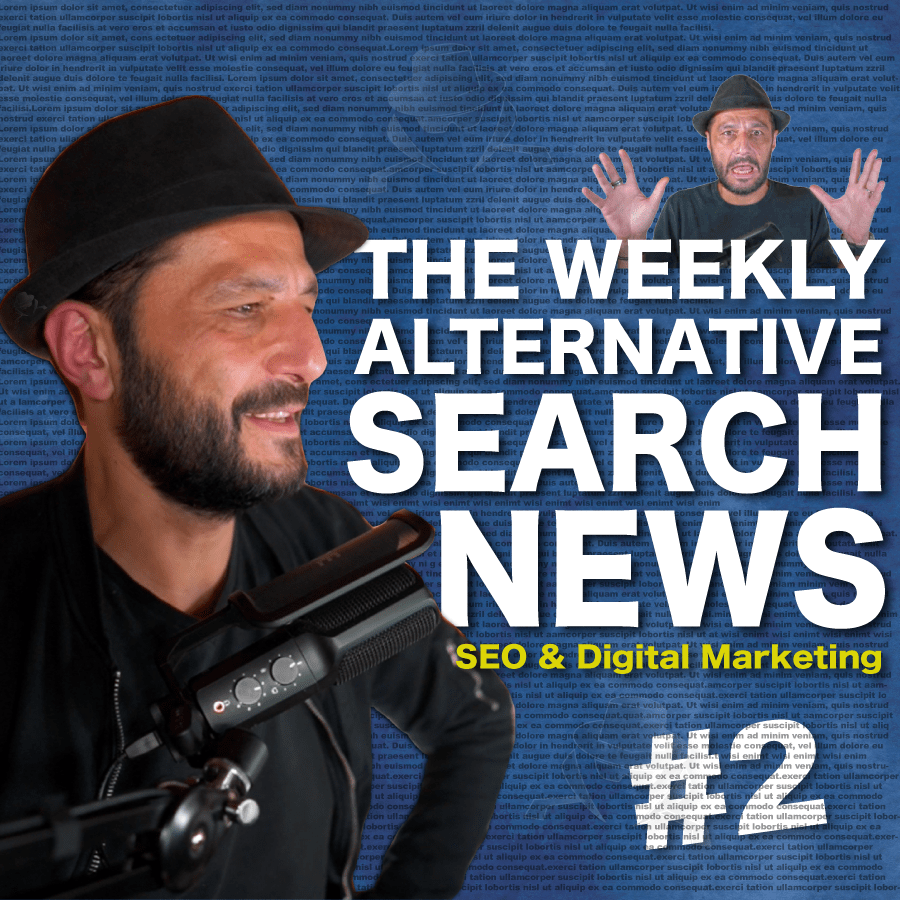Alternative Search News Week 32, 2020
- Youtube influencers are the most trusted by consumers
- Metadata Schemas need more attention
- A few negative online reviews early on can hurt a restaurant
- Google local pack on desktop gets a call button
- GoogleBot vs Dynamic Rendering
- Harmful Blog Comments
- Facebook says Apple’s iOS 14 changes could hurt its ad targeting
- Troll of the year by Neil Patel : « It’s hard to beat your competition when you’re copying them. »
- Google asks some searches if they felt the earthquake after doing searches on earthquake now
- SEO myth-busting: What is not a Google search ranking factor
- Even Google Screws Up Technical SEO
- Instagram Displayed Negative Related Hashtags For Biden, But Hid Them For Trump
- Facebook Fired An Employee Who Collected Evidence Of Right-Wing Pages Getting Preferential Treatment
- Documents from the Hearing on “Online Platforms and Market Power: Examining the Dominance of Amazon, Apple, Facebook and Google
- CNBC Summary of Big Tech Hearing documents
- Alphabet raises $10B with the biggest, cheapest bond sale in its history
Youtube influencers are the most trusted by consumers
On Digitalinformationworld.com
They are reporting a study where the percentage of preferred consumers over the last six months influenced to purchase a product or service by influencers: 27% of them voted for youtube , 24% for instagram and 15% for TikTok.
In my opinion it makes sense. On video it’s a lot harder to fake it.
I’m not saying it’s impossible but it’s a lot harder.
With the written word and pictures it’s much easier to paint a picture that is not totally truthful, while lying on camera is a whole different game.
Metadata Schemas need more attention
Mr Alex Kreidler is reporting on ThreatReaderApp.com that Google and other tech giants should be a little more serious about what they do with the whole structured data metadata schema.org.
You know, how do you explain to a robot that doesn’t understand what it reads? What is actually the entity? The whole Semantic Web thing which is different than Semantic SEO, not the same game.
But what’s happening here is on the GitHub repository for schema.org
There are currently 600 open issues with 15 pull requests including 2 critical breaking issues just within this past week.
It does take people. It does take resources and I think Google and the other ones have to take it seriously if they want to control it.
Please do something about it because it’s not moving very fast.
My first keynote on the topic was in French, in 2012 or 2013.
And not so much happened since then.
So yeah I don’t have the solution but please Google and the others, get on it.
A few negative online reviews early on can hurt a restaurant
On EurekaAlert.org : How a few negative online reviews early on can hurt a restaurant
They are reporting a study of 3 000 restaurants over in Franklin county, Ohio.
They looked at Yelp and Tripadvisor and they suggest that a few negative online reviews early on can really hurt a restaurant.
It’s a huge debate : the online review business and scheme.
Again I saw this be like starting off. You know all those review websites and and the trend of reviews and the way it’s more or less biased.
A topic where I don’t have the solution again but I know there is a big problem there.
Google local pack on desktop gets a call button
Mr Barry Schwartz report that on the Google Local pack now you get a call button instead of having the phone number. It’s just a button you can call.
And then I don’t think it makes a big difference because on a smartphone you could also just click on the number and you can directly get the company but yeah it looks pretty.
GoogleBot vs Dynamic Rendering
Martin Splitt, the javascript specialist at Google Zurich not Mountain View okay? Switzerland!
So he’s one of the spokespersons for Google and he’s answering
a question by Mr Victor Pan, SEO at HubSpot.
The question is “If Googlebot uses a non-googlebot user-agent to check CLS, LCP, and whatever other Web Vital metric, what would its name be called? We implemented dynamic rendering for googlebot. Should those dynamically rendering worry about poor url web virals in the google search console?”
Martin answers in a long series of tweets and I didn’t read them all but
the first one is:
“- Googlebot measuring things
– Dynamic rendering and performance
– Performance and UX
– rUM vs. lab data
– GSC Web Vitals report
Googlebot renders with the Googlebot UA. When it renders, some lab data measurements can be gathered, while we’re at it. But that’s not the whole story. But yeah, no measuring Googlebot with a non-Googlebot UA we need to worry about.
So that’s something to be aware of: 1.) We can’t just rely on the data Googlebot measures for your performance 2.) Your users (those you should really care about, btw) might suffer a slow experience and you wanna fix that – because slow websites aren’t great for users.”
Basically in my opinion what’s going on here is that Google says that it can render like a browser and so on and do a lot of fancy stuff but
does it really do it?
At the scale of the whole web and does it do it well? I have some doubts but I’m open to the discussion here.
They’ve done it in the past. They’ve done it with Flash and i think they’re doing it again with this whole javascript dynamically rendering thing.
Where they pretend it’s all good when it’s not.
Harmful Blog Comments
On the “Search Off the Record”, the official google webmaster podcast.
They spoke about comments and I think they are missing something here.
In my opinion, the whole condom of the web, the rel=nofollow came from the intent of being able to just put a non-trust tag, as far as pagerank distribution, on the link, especially when you didn’t monitor your comments.
That obviously blew way over.
The fact that you don’t monitor your comments and let the spammers spam but it didn’t matter because the precious pagerank juice would not flow.
But now it’s still on the table regardless of the fact that Google killed the whole comment game in the spam comments because it’s all nofollow and now not that many people comment on blogs anyway.
But Gary Illyes is saying that if the comments are R-Rated and it might have some cursing or whatever, it could be a negative signal and it’s also said that “if we can detect that the meaty part of the content is in the middle and between these sections, then very likely, that wills be the pooling content for your ranking”.
And this is true. I mean at least I believe that but I think they missing the point of what is a bad comment. A bad comment might not be about cursing or not cursing.
I think it’s about: is it really spammed or not?
Is your comment in the middle of other comments promoting viagra
online gambling or cheap rolex?
That’s what I think would be very bad content in comments, not really the cursing but I don’t know.
They work for Google, right? They’re supposed to know better.
Facebook says Apple’s iOS 14 changes could hurt its ad targeting
On CNBC.com.
Apple is going flat out full-on into the privacy thing.
And Facebook targeting relies on heavy profiling, which is more difficult on mobile than on the desktop, on the computer.
But now with the new operating system by Apple; it will become a lot harder.
From a marketer’s standpoint? Well that doesn’t matter.
For Facebook? Yeah it’s probably gonna suck.
Troll of the year by Neil Patel
«It’s hard to beat your competition when you’re copying them.»
Well unless you are Neil Patel and you copy your competition or you repurpose the content of everybody else.
But you have some money because you had a couple of successful startups early on. Good for you and you spend your money wisely,
you pay your way to the top.
Well obviously if you’re not innovative, If you’re not original it’s harder.
But for somebody like Neil, it doesn’t seem so hard because you can buy what others are trying to build organically.
Google asks some searches if they felt the earthquake after doing searches on earthquake now
Barry Schwartz again.
It’s very funny because somebody picked up that if you googled earthquake now you could have an answer box asking “did you just feel shaking?” with three answers possible: yes I did, no I didn’t & unsure.
That’s machine learning for you but when you think of back in the days, you could see tweets about an earthquake before the earthquake and that used to blew my mind.
But now the fact that Google is also trying to pick up on that trend and trying to figure out how to be on real time proactive on the news is interesting.
SEO myth-busting: What is not a Google search ranking factor
We have again Barry Schwartz for some SEO myth-busting : what is not a Google search ranking factor?
We just published on SEOConspiracy a myth-busting video about the 200 ranking factors:
I don’t believe that we influenced Barry Schwartz to write this, it’s not possible.
SEO Conspiracy is just a new & tiny little podcast.
How could we influence Google coming back on season 2 with their SEO myth-busting and Barry Schwartz pulling out some SEO myth-busting articles.
Nah not possible… What do you think?
So, Barry goes on through an entire list with sources, for example, search quality raters guidelines rating, another SEO Conspiracy podcast from the early days:
Also, Google ads, Social media mention, click-through rates from search results, pogosticking back to the search results page, dwell time, bounce rate, and so on…
The problem I have, Barry, is that for most of your sources, some of them are official Google blog but most of them are Google spokespeople Danny Sullivan, John Mueller, Gary Illyes or others.
I have a problem with this because who is monitoring them? Like they
are not engineers in Mountain View. Okay?
They didn’t make the search engine. They work for Google in Zurich, Switzerland and I’m making a video right now with the title “dear googlers” because I want to know. I want to know how far
can I trust them?
What are their credentials? Why are they supposed to be the ultimate truth?
And why can they be cited as a trusted source in a reputable like trusted source like SearchEngineLand and someone with a very high reputation like Barry Schwartz.
I don’t know because I disagree with a bunch of them.
We’ll see. Different video for this topic.
We need to talk about this . Can we trust the googlers?
Even Google Screws Up Technical SEO
On LocalSEOguide.com: Buck Up, Even Google Screws Up Technical SEO
The best way to negative seo yourself is to do a wrong rel canonical and that’s what they did here.
They messed up on a google.com/business was google.com/international/en-us/business.
But the canonical tag has changed to the wrong url. That’s bad.
You definitely can kill your site with with this.
But if you are google yourself, that won’t be a big issue you will come
back as soon as you fix it.
And even if you are not google it will come back.
Instagram Displayed Negative Related Hashtags For Biden, But Hid Them For Trump
On Buzzfeed: Instagram Displayed Negative Related Hashtags For Biden, But Hid Them For Trump
Also on Buzzfeed: Facebook Fired An Employee Who Collected Evidence Of Right-Wing Pages Getting Preferential Treatment
“A technical error caused the number of hashtags to not show related hashtags. We’ve disabled this feature while we investigate.”
Google and other companies got some heat by Trump because they seem to favor the other side and now it’s Facebook or I mean Instagram is Facebook, owned by Facebook anyway so it’s the other side and apparently when you were typing Joe Biden you would find some negative hashtags like: #democratsdestroyamerica, #creepyjoebiden, #republicansagainsttrump, #neverbiden
So are those startups… I mean they’re not startups anymore. They’re huge companies, masters of the world.
Do they manipulate the elections? I don’t know. What do you think?
Documents from the Big Tech’s Hearing
On Judiciary.house.gov: Documents from the Hearing on “Online Platforms and Market Power: Examining the Dominance of Amazon, Apple, Facebook and Google
Following the Big Tech hearings, the anti-trust hearing, on the official house committee website, they published all the exhibits for Amazon, Apple, Facebook, Google. Tons of tons of documents and I looked through a few of them.
There are so many you can find a summary on CNBC.com: We read hundreds of pages of emails that Congress collected from the biggest tech companies in the world — here are the most revealing things we found.
What’s interesting is for Facebook it looks like they really focus on the whole Instagram issue. Saying that the way the deal went is not fair and the fact that you copy a platform while you try to buy it is not fair business.
For Amazon, it looks like the whole marketplace and then basically the mindset of the pricing; the acquisition, the way for example, they competed with diapers.com and so on.
They’re looking at it very in a lot of details about the way Amazon could have some predatory practices.
But it’s definitely on the marketplace side and even on AWS but
where they have a relationship with other businesses.
If Amazon stayed the way it was before the marketplace, maybe they would not be here today.
Apple that’s the app store, the Apple tax, the way they might also copy features of competing apps. That’s what’s on the lens of the antitrust case.
And Google is all over the place. I mean advertising, Android, etc.
How they can really get into every aspect of people’s lives. Also the deal with Youtube. The way they bought out Youtube. There are a lot of smoking guns for Google here.
We will see when the report will come out.
Alphabet raises $10B with the biggest, cheapest bond sale in its history
On thenextweb.com: Alphabet was already sitting on $121B in cash and small investments
Corporate greed at play like we said with Kristine during our debrief of the big tech hearing:
When they went public the IPO changed everything. It builds a different company. Alphabet raises 10 billion dollars with the biggest cheapest bond sale in its history.
While they are sitting on 121 billions in cash but basically, they borrowed for so cheap so it’s a five-year trench promise buyers 0.45% interest and the yield is 1.1% so it’s cheaper and that’s common practice.
Apple has done it. Big corporation they all do it.
Because it’s cheaper to borrow money than you to use your own money. I don’t understand. Honestly this is too this is too difficult for me.
That’s all folks.
See you next week and in the meantime, please feel free to react to this news and tell me what you think about all this.
Listen to the podcast
Watch the video
Latest posts



